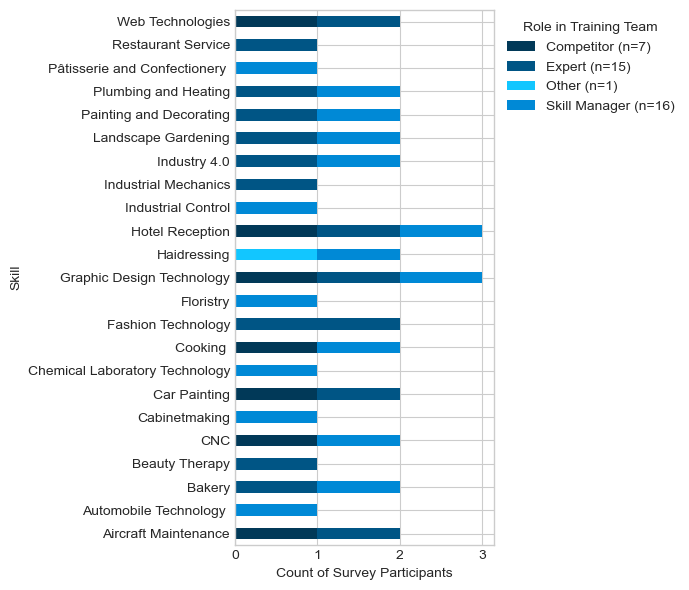A digital training platform to support vocational skills competition training
Margit Tennosaar, expert in Web Technologies developed a concept during her studies for a platform that can be utilised in the training of any competition skill.
 Margit Tennosaar
Margit Tennosaar
- Teacher, Web Technologies Expert, Business College Helsinki
- Over 15 years of experience in vocational skills competitions as a coach, expert, and competition organiser. WorldSkills Web Technologies Expert and EuroSkills Skill Advisor.
- Background in the private sector as a UX/UI designer and front-end developer, combining design and technology.
- Recognised as Supervisor of the Year, Estonia (2015) and Teacher of the Year, Tartu (2012).
- Balances work with running, hiking, and traveling, as well as painting, gaming, reading, and continuous learning.
Why does Skills Competition coaching need digitalisation?
Preparing for vocational skills competitions is an intense process that requires technical expertise, long-term training, effective feedback utilisation, and structured management of the entire process. I have seen firsthand the dedication and effort that competitors and coaches invest in reaching the highest level—and, simultaneously, how challenging it can be to manage all the accumulated information, training plans, and feedback across different platforms. Developing the training process for skills competitions has been vital to me for a long time, particularly in systematising and clarifying the coaching structure.
Vocational Skills Competitions as a key part of career
I teach at Business College Helsinki, am an expert in the Web Technologies category at WorldSkills, and a Skill Advisor at EuroSkills. Vocational skills competitions have been a significant part of my life for over 15 years. I have worked as a coach and an expert, developing skills competitions and training processes nationally and internationally.
Skills competitions provide a unique opportunity to develop and apply vocational skills in real-world scenarios. At the same time, competition training highlights key areas for improvement, helping competitors and coaches focus on what truly matters. After years of coaching experience, I have identified a clear need for digital tools to support training. How could all the data, practice, and feedback be integrated into a system that best serves competitors and coaches?
Returning to higher education
My journey started with web design and development studies in Estonia. I wanted to understand how digital services are designed and built, and web development provided the perfect opportunity.
After gaining years of industry experience, I wanted to finalise my higher education and challenge myself academically again. I pursued an MBA in Business Technologies at Haaga-Helia University of Applied Sciences, specialising in digital business opportunities. To push myself even further, I decided to complete the program in Finnish, even though it is not my native language. This added an extra challenge and allowed me to deepen my understanding of industry concepts from a new perspective.
The best part of my studies was the practical approach—I could apply what I learned immediately to real projects. I gained a deeper understanding of how technology and user experience interact, and I realised that the best way to grow is through continuous hands-on learning.
A digital coaching platform for competition training
My thesis was driven by a need to improve the training process for Finland’s national team in vocational skills competitions. In my thesis, "Developing a Digital Training Platform Concept for International Vocational Skills Competitions", I explored how digital tools could enhance competition coaching.
Link to the thesis (Theseus.fi)
The vocational skills competition training process is extensive, accumulating vast data, training sessions, and feedback over time. Currently, this information is scattered across different platforms, making it difficult to track progress effectively. I aimed to determine whether digitalisation could make training more structured, systematic, and transparent.

The long-term training process includes pre-competition, competition, and post-competition periods, all considered in the training platform cycle.
In my thesis, I used service design methodologies to address this problem and interviewed competitors, coaches, and experts to gain insights into their needs. Based on my research, I developed a concept for a digital coaching platform that integrates training plans, feedback, and progress tracking into a single system.

A total of 39 participants from the Finnish Vocational Skills Competition National Team took part in the research.
How can this concept support competition training?
The platform would provide competitors and coaches with a clear training structure, help them visualize progress, and support learning by offering a comprehensive overview of the training journey. Centralizing all data in one place would make training more goal-oriented and efficient, benefiting both coaches and competitors.
![]()
The most needed training platform feature is a digital training diary that combines a training plan and calendar and is accessible and trackable for all team members.
This concept is not just theoretical—my research demonstrated an apparent demand for such a tool. Digitalising the training process can improve transparency, streamline communication, and help all involved track progress effectively. However, the most crucial aspect is that technology serves as a supporting tool—it does not replace the role of coaches and competitors but instead helps structure and enhance training.
Next Steps – Implementing the concept in practice
The next step is to develop the concept further and explore how it could be implemented to support vocational skills competition training. The competition environment is constantly evolving, and coaching must keep pace with these changes. Digitalisation presents excellent opportunities to enhance training, and I hope this concept can be implemented within Finland’s vocational skills competition coaching system in the future.